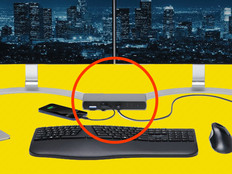How Barcode Scanners Are Speeding Up the Government
In Gwinnett County, Ga., citations weren't just an unpleasant experience for the recipients, but also for the police officers who had to write them. Data entry was cumbersome, error-prone and often led to discrepancies with other critical paperwork.
"Handwritten citations are sometimes inaccurate or difficult to read, and the records management team duplicated efforts inputting data into the records management system," says Barry Puckett, deputy director and deputy CIO for Gwinnett County's Department of Information Technology Services. "There were a lot of inefficiencies."
To streamline processes and reduce errors, the county deployed Motorola MC75A wireless handheld barcode scanners to the police department's 850 officers. Now they can simply scan an offender's driver's license or vehicle identification number and automatically populate corresponding citation form fields.
The technology shortens the length of traffic stops and significantly reduces the likelihood of mistakes. What's more, records management teams can directly access the data.
Easing Inventory
Like many of their government peers, Gwinnett County is finding myriad uses for barcode scanners. For example, a fingerprint scanner attachment for the handheld devices can identify individuals who were previously arrested. "The fingerprint scan is sent through state and national crime databases to find out if the person has a prior record," Puckett says.
Gwinnett County also uses the barcode scanners for inventory control among several departments, including fire and emergency services. Supplies such as rubber gloves and printing paper are loaded onto trucks and delivered around the county to each station and scanned into a SAP database so stock can be replenished before it gets too low. Puckett says the system has proved to be essential for chargeback tracking and reporting because each fire station represents a different cost center.
Randi Powell, research analyst for Deltek, says barcode scanners offer several benefits to governments. "Decision-making and efficiency are improved when you're able to collect and retrieve data faster," she says.
Mobility has boosted demand because organizations can put barcode scanners in the field for real-time data access. For example, the city of Dallas issues handheld scanners to departments to ensure the accuracy of grant-funded asset inventories.
In the past, the Dallas police, fire and public works departments would manually complete a spreadsheet to satisfy the requirement of bi-annual grant audits from the Department of Homeland Security and the Department of Justice. However, it was difficult to track purchased equipment that was retired or broken and to verify who had actually conducted the inventory review, according to Dina Colarossi, a city fund analyst.
6,500 The number of items the city of Dallas has bar-coded to make the public grant audit process faster and more accurate
At the time, the city's urban search and rescue team used barcode scanners to ensure that all equipment loaned out during a mission remained accounted for. In 2008, Colarossi centralized management of the team's Wasp Barcode software, purchased additional handheld scanners from the company and extended the $5,000 system to the rest of the city.
Now all grant-funded items — including handheld radios, tents, chainsaws, GPS locators, video cameras and fire trucks — are bar-coded with unique identifiers. Departments use handheld scanners to manage their own inventory, which is captured in a centralized database. Colarossi generates inventory reports on the overall status, whether items are missing or have been displaced, and what items have been retired or broken. The audit process is faster, more accurate and features built-in accountability.
Verifying Voters
Speed, efficiency and accuracy are all traits that attracted the Virginia State Board of Elections (SBE) to barcode scanner technology, according to IS Manager Matthew Davis. SBE sought an alternative to having the state's 134 registrars spend valuable time trying to decipher handwritten voter registration forms submitted through the Department of Motor Vehicles.
To lessen the resource burden, when voters register at the DMV, agents print a form that includes a barcode of the user's name, Social Security number, date of birth and other information. Once a voter signs it, the DMV sends the form to SBE, which then forwards it to the correct local registrar. Registrars process the form with a Honeywell 4600g handheld scanner, which automatically inputs all information into a voter database.
Before a big election, when registrars receive upwards of hundreds of thousands of voter registration forms over several months, barcode scanners are a lifesaver. "Considering the registrar staff sizes range from one to 40 people, automating the process definitely helps," Davis says.
Like many government agencies, Davis' agency isn't done testing his barcode system's capabilities. He fully expects the technology to further improve the experience for the commonwealth's more than 5 million registered voters.
Cautious About QR
While the commercial sector is hot for quick response (QR) codes, the two-dimensional barcodes haven't garnered as much enthusiasm within government agencies.
"QR codes are still about five to 10 years away from mass implementation within government enterprises," says Randi Powell, a research analyst for Deltek. She attributes the delay to the fact that some government agencies are still buying the traditional barcode systems and will want to get the most from those investments.
Matthew Davis, IS manager for the Virginia State Board of Elections, agrees and adds that in his agency, there is no need today for the amount of data QR codes pack. "The elections process is very paper-intensive, so barcode scanning [as part of voting] in our state will remain simplistic for quite some time," he says.







